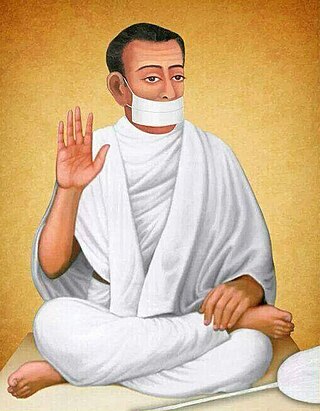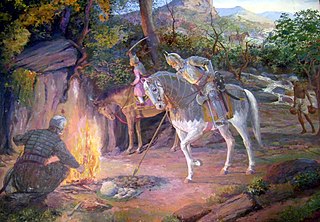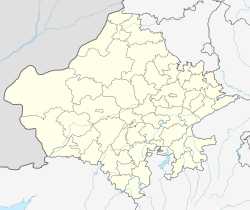
Rajasthan is a state in northern India. It covers 342,239 square kilometres (132,139 sq mi) or 10.4 per cent of India's total geographical area. It is the largest Indian state by area and the seventh largest by population. It is on India's northwestern side, where it comprises most of the wide and inhospitable Thar Desert and shares a border with the Pakistani provinces of Punjab to the northwest and Sindh to the west, along the Sutlej-Indus River valley. It is bordered by five other Indian states: Punjab to the north; Haryana and Uttar Pradesh to the northeast; Madhya Pradesh to the southeast; and Gujarat to the southwest. Its geographical location is 23.3 to 30.12 North latitude and 69.30 to 78.17 East longitude, with the Tropic of Cancer passing through its southernmost tip.

Jodhpur is the second-largest city in the Indian state of Rajasthan and officially the second metropolitan city of the state. It was formerly the seat of the princely state of Jodhpur State. Jodhpur was historically the capital of the Kingdom of Marwar, which is now part of Rajasthan. Jodhpur is a popular tourist destination, featuring many palaces, forts, and temples, set in the stark landscape of the Thar Desert. It is popularly known as the "Blue City" among people of Rajasthan and all over India. It serves as the administrative headquarters of the Jodhpur district and Jodhpur division.

Marwar is a region of western Rajasthan state in North Western India. It lies partly in the Thar Desert. The word 'maru' is Sanskrit for desert. In Rajasthani languages, "wad" means a particular area. English translation of the word 'marwar' is 'the region of desert.'
Pali is a city and capital division in Rajasthan state of India. It is the administrative headquarters of Pali District. It is on the bank of the river Bandi and is 70 km (43 mi) south east of West Jodhpur. It is known as "The Industrial City".

Acharya Bhikshu (1726–1803) was the founder and first spiritual head of the Swetambar Terapanth sect of Jainism.

Durgadas Rathore was the Rathore Rajput General of Kingdom of Marwar. He is credited with having preserved the rule of the Rathore dynasty over Marwar, India, following the death of Maharaja Jaswant Singh in the 17th century. In doing so he had to defy Aurangzeb, a Mughal emperor. He commanded the Rathore forces during the Rajput War (1679–1707) and played a major role in the Rajput Rebellion (1708–1710) which became one of the main reason of decline of Mughal Empire. He was elected as the leader of the revolt along with Raja Jai Singh II of Jaipur. He won a number of victories against the Mughals and forced many Mughal officers to pay tribute to him in the form of chauth.

Rao Maldeo Rathore was a king of the Marwar from the Rathore dynasty, who ruled the kingdom of Marwar in present day state of Rajasthan. Maldeo ascended the throne in 1531 CE, inheriting a small ancestral principality of Rathore's but after a long period of military actions against his neighbours, Maldeo swept significant territories which included parts of present day Rajasthan, Haryana, Uttar Pradesh, Gujarat and Sindh. He refused to ally with either the Sur Empire or the Mughal Empire.

Rao JodhaRathore(28 March 1416 – 6 April 1489) was a ruler of Mandore in the present-day state of Rajasthan. He was the son of Rao Ranmal of the Rathore clan. He is known for his illustrious military career and for founding the city of Jodhpur in 1459.

Jaswant Singh Rathore was a Maharaja of Marwar in the present-day Indian state of Rajasthan. He was a distinguished man of letters and author of "Siddhant-bodh", "Anand Vilas" and "Bhasa-bhusan".

Pali district is a district in Rajasthan, India. The city of Pali is its administrative headquarters.

Ladnu, also Ladnun, is a city and a municipality, nearby Nagaur city in Nagaur district in the Indian state of Rajasthan. It is a Tehsil headquarters of Nagaur district. This city is famous as the birthplace of sacred Jain Aacharya Tulsi. It is the city of Jain temples and one of the most visited pilgrim places of Jain community after Shri Mahaveer ji. Ladnun is also home to the Jain Vishva Bharati University, several Jain temples with extensive marble work, Ramanand gaushala and other old temples of religious and architectural importance. Places within 15–20 km of Ladnun include Tal chhapar, Dungar Balaji, Salasar Balaji Dham, Tirupati Balaji at Sujangarh,Bhairav Baba Mandir at Bader village. Ladnun is also famous for cotton sarees.

Udai Singh Rathore, also known by the sobriquet Mota Raja, was the Rathore ruler of Marwar, which was later known as Jodhpur. He was also the maternal grandfather of Shah Jahan, the fifth Mughal Emperor, and an ancestor of all subsequent emperors.

Kingdom of Marwar, also known as the Jodhpur State under the British, was a kingdom in the Marwar region from 1243 to 1818 and a princely state under British rule from 1818 to 1947. It was established in Pali by Rao Siha, possibly a migrant Gahadavala noble, in 1243. His successors continued to struggle against regional powers for domination and 9 out of 15 rulers till 1438 died in combat. In 1395, its capital was changed to Mandore by Rao Chunda and to Jodhpur in 1459 by Rao Jodha.
Jojawar is a village located in Marwar Junction tehsil of Pali District in Rajasthan State, India. The mountains of the Aravalli Range are very near to this village. Jojawar is the location of the Jawahar Navodaya Vidyalaya school for Pali District, located about 1.5 km away on the Marwar Junction road.
Rajasthani people or Rajasthanis are a group of Indo-Aryan peoples native to Rajasthan, a state in Northern India. Their language, Rajasthani, is a part of the western group of Indo-Aryan languages.

Dursa Arha was a 16th-century warrior and Rajasthani(Dingal) poet from India. He earned the epithet of the 'First Nationalist Poet Of India' or Rashtrakavi because of his nationalist stance in his bold Dingal poems commending Maharana Pratap of Mewar in his struggle against the Mughal Empire. He is one of the most highly regarded poets of the time, who was also a valuable and respectable part of the Mughal court. He was a renowned litterateur, historian, war general, consultant, administrator, feudal lord, and magistrate. He had close relations with the rulers of many erstwhile kingdoms. On the basis of wealth, fame, and honor Dursa Arha acquired in his lifetime and his contribution to medieval Indian history and literature, the historians and litterateurs consider him as one of the greatest poets. Dursa Arha attained heights of opulence and grandeur reached by no other poet in history.

Abhai Singh Rathore was an 18th-century Indian Raja of the Kingdom of Marwar (Jodhpur).
Described variously as the Rajput war by Jadunath Sarkar, Rathore war of independence by V. S. Bhargava and Rathore rebellion by M. Athar Ali, the conflict between Rajputs of Marwar and the Mughals started after the death of Jaswant Singh of Marwar, due to Aurangzeb's attempt to interfere in the succession of Marwar. The resistance to Mughal interference was started by the Rajput nobles under Durgadas Rathore and erupted into an all-out war between the Mughal empire and Rajputs of Marwar supported by Mewar Rajputs. It lasted for almost thirty years. The rebellion reached a climax after the death of Aurangzeb on 3 March 1707 and the capture of Jodhpur by the Rathores on 12 March 1707.















